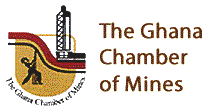The Ghana Chamber of Mines has revealed that its producing member companies contributed over US$5.5 billion to the Ghanaian economy in 2024 through a combination of procurement, social investments, and fiscal payments. The announcement underscores the mining sector’s vital role in driving national development, job creation, and economic stability.
According to the Chamber’s report, a substantial portion of the expenditure, $3.5 billion, was directed toward procuring goods and services, a move that demonstrates the industry’s efforts to promote local content and strengthen supply chains within Ghana.
Beyond procurement, member companies invested $28 million in corporate social responsibility (CSR) initiatives aimed at uplifting livelihoods in mining communities.
The Chamber described these investments as proof of the industry’s enduring commitment to Ghana’s socio-economic transformation.
“Our member companies have consistently shown that mining is not just about extracting resources but also about building resilient communities and supporting the broader Ghanaian economy.”
Ghana Chamber of Mines
The report further highlighted major capital expenditures of US$973 million in 2024, underscoring the sector’s role in infrastructure development and technological upgrades.
Member companies also imported consumables worth US$241 million and made loan amortization and interest payments amounting to US$111.3 million.

A notable achievement during the year was the sale of 358,218 ounces of gold by producing member companies to the Bank of Ghana under the Domestic Gold Purchase Programme (DGPP).
The Chamber said this initiative contributed directly to efforts by the central bank to strengthen Ghana’s foreign reserves and stabilize the local currency.
“The DGPP is a clear demonstration of our industry’s alignment with national priorities. By supporting the Bank of Ghana, we reaffirm our commitment to macroeconomic stability and the country’s long-term prosperity.”
Ghana Chamber of Mines
Employment data from the report also paints a picture of strong local participation in the mining sector. In 2024, the industry provided direct employment to 11,372 people, of whom 11,303 were Ghanaians.
This translates to over 99% of the total workforce, with expatriates accounting for just 0.6% (69 individuals). In total, mining companies paid US$615 million in compensation to employees during the year.
“These figures reflect the mining industry’s critical role in providing decent jobs for Ghanaians and building local expertise.”
Ghana Chamber of Mines
Strategic Partner in National Development

The mining industry’s contribution to government revenue was equally significant. Over GHC10.3 billion was paid in corporate tax alone in 2024, reinforcing mining’s position as one of the largest sources of fiscal revenue for the country.
“The mining sector remains a strategic partner in Ghana’s development agenda—not only as a revenue generator but also as a catalyst for socio-economic transformation.”
Ghana Chamber of Mines
Industry observers note that the sector’s strong fiscal performance in 2024 came despite global headwinds, including fluctuating commodity prices and inflationary pressures.
The Chamber attributed the resilience to sustained investments in operational efficiencies and a focus on fostering mutually beneficial relationships with stakeholders, including government, host communities, and suppliers.

Looking ahead, the Chamber emphasized the need for continued collaboration between the government and industry players to sustain the momentum.
“To maintain and grow these contributions, we urge all stakeholders to work together to ensure a competitive and predictable policy environment that attracts investments while safeguarding community and environmental interests.”
Ghana Chamber of Mines
As Ghana seeks to diversify its economy and navigate global economic uncertainties, the mining industry’s performance in 2024 has demonstrated its capacity to anchor national development.
From supporting foreign exchange reserves to creating jobs and funding community projects, the sector remains an indispensable pillar of Ghana’s economic framework.
Read Also: Banking Sector Shakeup: Five Ghanaian Banks Under Intense BoG Scrutiny Over Capital Failures



















